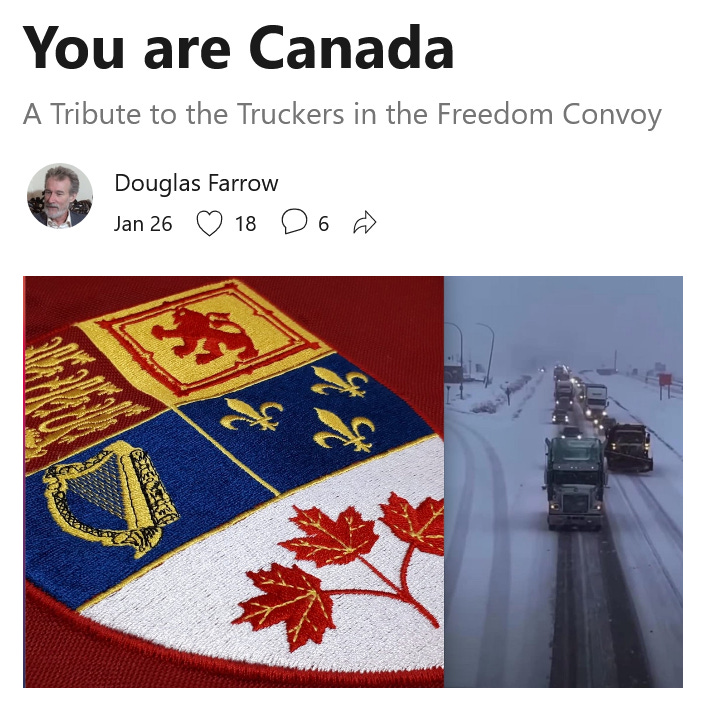Canada's freedom truckers inspire (some) academics to write in solidarity and support
Commentary by Claus Rinner - 4 February 2022.
Canadian academics from disciplines not directly related to medicine and health sciences have been largely absent from public debate about the COVID-19 crisis. In particular, the side of those criticizing the pandemic response measures consists primarily of the few medical doctors and health scientists willing to risk their careers by raising concerns about the prevailing narrative.
Are all Canadian academics silent? No, a small group of humanities scholars, natural and social scientists as well as engineers are distancing themselves from the mainstream narrative. Moving to a first-person account for a moment, some of us have organized as Canadian Academics for Covid Ethics (CA4CE) and follow with great interest the developments around Freedom Convoy 2022 and its arrival in Canada’s capital city, Ottawa.

In a blog post titled “You Are Canada”, Dr. Douglas Farrow, Professor of Theology and Ethics at McGill University in Montreal, Quebec, writes “A Tribute to the Truckers in the Freedom Convoy”. After reminiscing about his long-ago experience driving “articulated lorries” across Europe, Farrow outlines worries about impending surveillance and social-credit systems and pinpoints the new gods of global tech and public health. In just a few paragraphs, the post articulates the truckers’ leading role in the ongoing battle for freedom.
Meanwhile, in the Western Standard, Dr. Travis D. Smith describes how “Night in truck stop shows true value of being Canadian”. Smith, Associate Professor of Political Science at Concordia University, also in Montreal, conveys the atmosphere at an Ontario/Quebec border truck stop as a festival of sounds and lights, where “Strangers approached each other with smiles, cheers, nods, and friendly gestures”. People from various backgrounds, “French- and English-speaking alike, young and old, vaccinated and unvaccinated” gathered in support of the convoy. In essence, Smith applauds these Canadians for finding their humanity again after two years of isolation and repression. Smith can’t help but take a hit at our Prime Minister Trudeau for his disappearing act in light of the approaching convoy. Smith also cautions of violence and terror—to be expected not from the side of the truckers but that of the Canadian government.

Most recently, Dr. Cornelius Christian, Associate Professor of Economics at Brock University in St. Catharines, Ontario, writes “I’m a Canadian of Color, a Professor, and I Support the Truckers” for the Brownstone Institute. Christian takes up the characterization of Freedom Convoy participants and supporters as uneducated racists, made by Trudeau and “Canadian socialist” leader Jagmeet Singh and parroted by mainstream media, and presents himself as a counter-example: “a first-generation Canadian of minority status and an economics professor, I have nothing but admiration for the truckers and their cause”.
Christian notes that freedom of medical choice was taken away not just for cross-border trucking but at universities too, ruining the careers of numerous high-skilled academics. Yet, while vaccinated and unvaccinated truckers stand in solidarity, there is little sympathy from academic colleagues and inconsistent support from unions.
Turning the racism charge against the Prime Minister and his team, Christian asserts that “The truckers’ convoy represents a victory of common sense over nonsensical intellectual posturing.” The author concludes the article outlining three short-term goals: the end of all mandates; accountability for the responsible elites; and legislative prevention of excessive pandemic response in the future.

In contrast to these few examples, it is difficult to understand why many of Canada’s and the world’s supposed best minds and critical thinkers are failing to recognize and articulate the cracks in the fear-based COVID-19 narrative and the colossal issues with the ongoing pandemic response. The feeble explanations range from (1) widespread over-specialization with a lack of confidence in speaking to anything but one’s own narrow field of expertise; (2) seclusion from the real world, its messiness, and thus lack of practicing common sense; and (3) a rigid intellectual obsession with public-good narratives and profound theoretical aversion against individualism. Yet, academics are by necessity highly individualistic, thus giving their virtue-signalling the taste of fake.
The same has to be said of those white-collar Ottawa residents who are complaining about the occupation of their city, yet may just be afraid of the unfamiliar sight and proximity of blue-collar workers and their multi-cultured supporters. We should all adopt-a-trucker, or at least “respect-a-trucker”, and indeed (re)learn to value each other’s opinions, priorities, and way of life.


